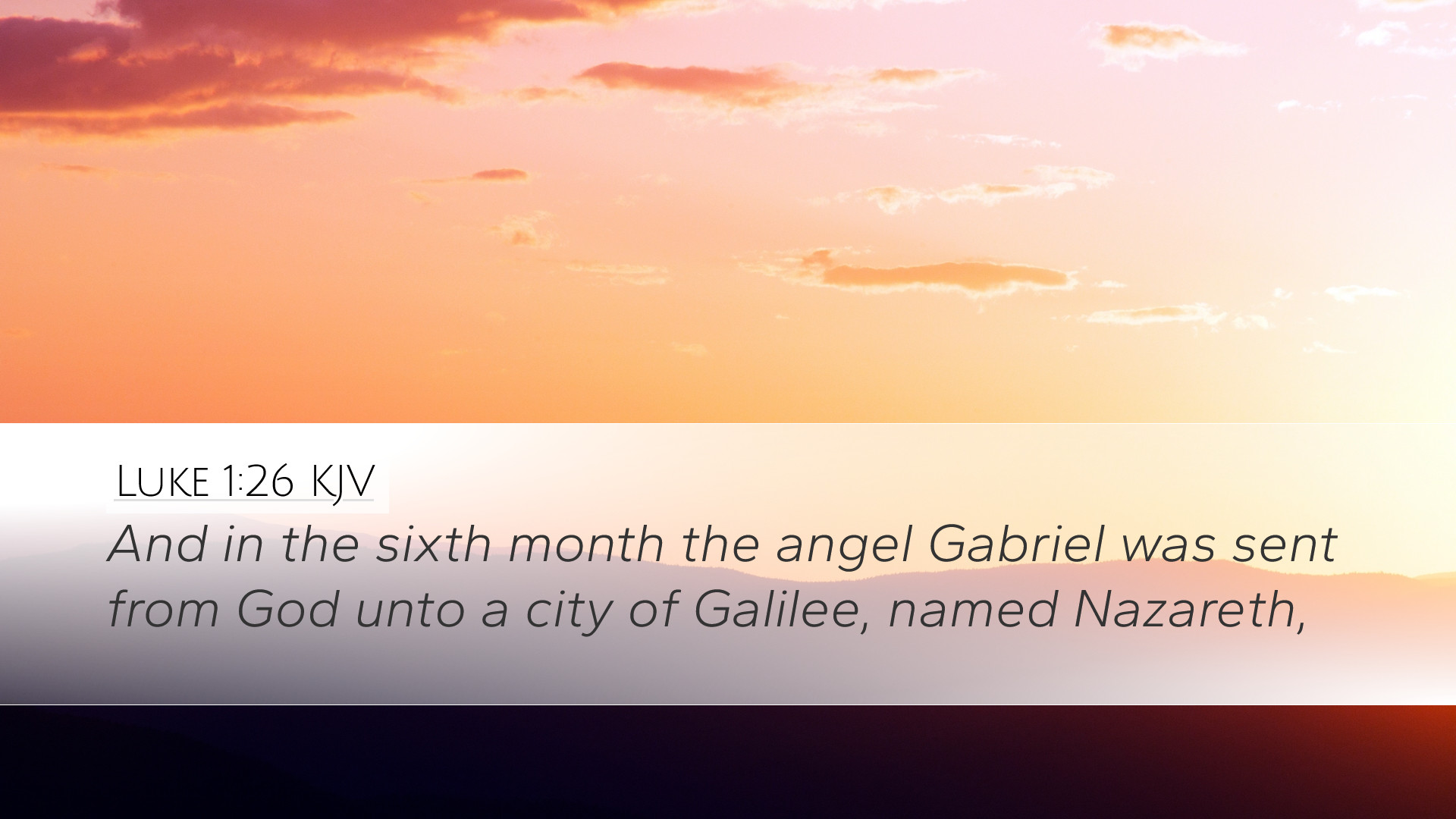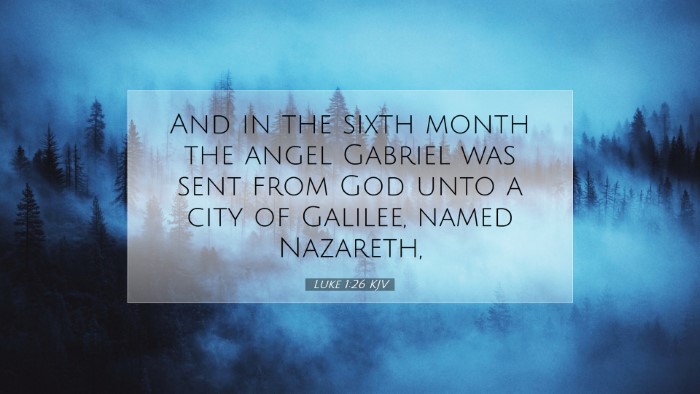Luke 1:26 - Commentary Overview
Luke 1:26 states: "In the sixth month the angel Gabriel was sent from God unto a city of Galilee, named Nazareth." This verse marks the pivotal moment in the Christian narrative, marking the Annunciation to Mary. Below, we explore various insights from public domain commentaries that provide depth and understanding to this significant passage.
Contextual Background
The passage occurs within the broader narrative of the Gospel of Luke, which emphasizes the divine origin of Jesus and the fulfillment of God's promises. Luke, as a meticulous historian, starts with a theological framework that prepares readers for the incarnation of Christ. Matthew Henry comments on the timing referenced in "the sixth month," noting that it relates to Elizabeth's pregnancy, underscoring God's sovereign plan and the interconnectedness of events.
Albert Barnes notes that "the sixth month" indicates God's timing, suggesting a divine orchestration rather than random chance. It serves as a reminder that God’s plans unfold according to His perfect schedule. The month serves as a climax in the narrative, where we move from prophesy to fulfillment.
The Significance of Angel Gabriel
In this verse, the angel Gabriel is introduced as the messenger of God. Adam Clarke remarks on the significance of Gabriel's role in the scriptures as one who communicates important revelations from God. Gabriel’s previous appearance in the Old Testament, specifically in Daniel 8:16 and 9:21, positions him as a key figure conveying divine messages about future events.
Attributes of Gabriel:
- Authority: Gabriel carries the authority of God, which signifies the utmost importance of his message.
- Divine Commission: He is sent specifically "from God," indicating that the forthcoming announcement is not of human origin but divine intent.
Nazareth: A City of Humble Origins
The choice of Nazareth as the location of this monumental event is significant. Matthew Henry emphasizes that Nazareth was an unremarkable and despised town, situated in Galilee. This choice exemplifies God’s tendency to choose the lowly and the humble for His purposes, which aligns with the prophetic nature of Christ’s mission.
Albert Barnes further explains that Nazareth’s status reflects God’s wisdom to confound the proud. He gleans from Isaiah’s prophecy about the Messiah coming from Galilee and underscores the scandal of the Messiah’s humble beginnings. Thus, God's selection of Nazareth serves to challenge worldly perceptions of greatness.
The Role of Mary
While this verse does not directly introduce Mary, it sets the stage for her vital role in the narrative. Adam Clarke provides critical insight into Mary's character. He emphasizes her humility, obedience, and readiness to serve God. The subsequent verses highlight her response to Gabriel, which is foundational in Christian theology regarding obedience to God’s will.
Luke's account exemplifies the concept of the “favored one” (Luke 1:28), noting that Mary was not extraordinary by earthly standards, yet was chosen for the extraordinary task of bearing the Son of God. Matthew Henry reflects on Mary's profound faith and her preparedness to embrace such a calling, reminding readers of the necessity of faith in divine missions.
Theological Implications
This passage opens up multiple theological discourses regarding God’s nature and His plan for salvation. Albert Barnes discusses the tension between divine sovereignty and human response. The respectful silence of Mary underscores the humility required to receive God’s purpose.
The key theological implications include:
- The Incarnation: This promise foretells the greatest act of divine love, where God becomes man, affirming God’s commitment to humanity.
- God’s Sovereignty: The sending of Gabriel signifies God’s direct intervention in human history.
- Humility and Faith: The narrative invites believers to embrace humility and faith reminiscent of Mary's response.
Conclusion
In summary, Luke 1:26 serves as a foundational text that invites deep theological reflection on the nature of God, His interactions with humanity, and the humble beginnings of Jesus’ earthly life. As pastors, students, and scholars engage with this text, they are reminded of God’s unexpected ways of working and the value of humility in faith. The narrative of Gabriel's announcement in Nazareth serves as an encouragement to recognize God’s unfolding plan in our lives, irrespective of our circumstances.


